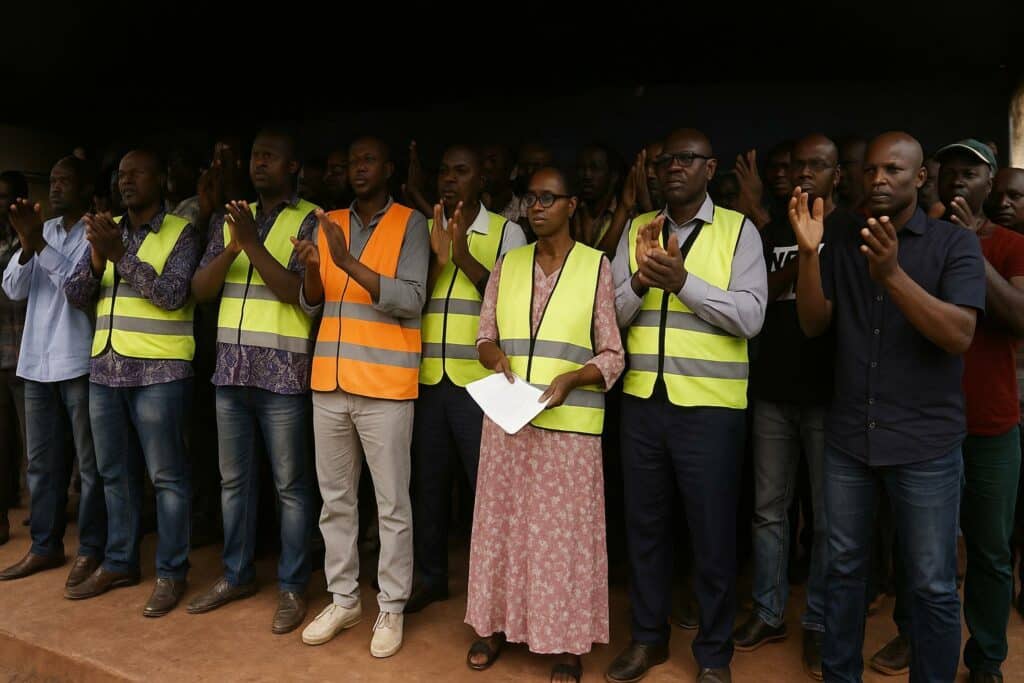Brazzaville statement reignites a simmering dispute
The first week of September opened with a rare but determined intervention from the National Collective of Abandoned Day Labourers of Energie Électrique du Congo, E2C’s sprawling public-utility subsidiary. In a carefully worded communiqué issued in Brazzaville on 5 September, the group expresses what it calls a “deep frustration” at the absence of concrete follow-up to the tripartite talks of 11 March 2025 between workers’ delegates, E2C executives and officials from the Ministry of Energy and Hydraulics. The statement, seen by this newspaper, accuses the company of allowing the agreed roadmap to “remain a dead letter”, in spite of what the collective views as clear signals of support from public authorities.
Beyond the rhetoric, the unease touches on the very fabric of Congo’s energy transition. Distribution and retail sales in a territory the size of the United Kingdom rely on a mosaic of short-term labourers who, according to union estimates, number several hundreds. For years they have provided the last mile of service in neighbourhoods where formal grid access remains fragile. Their central demand is not a pay rise but formal enrolment into E2C’s payroll, a request endorsed in principle during a much-publicised enrolment exercise carried out under police supervision on 8 March 2025.
Tracing the chronology of unmet commitments
The dispute’s gestation can be traced back to 13 February 2025, when a technical meeting—internally referred to as the “setting”—outlined a timeline for regularising day workers nationwide. The ministry’s note, confirmed to us by a senior civil servant, placed the onus on E2C to finalise contracts within sixty working days. Subsequent discussions on 8 March refined operational details, from biometric identification to the sequencing of medical examinations.
According to the collective, these milestones have now expired without formal letters of appointment. Representatives argue that the silence erodes trust in institutional dialogue, even if they remain, in their own words, “attached to the peace and development objectives championed by President Denis Sassou Nguesso”. Their invocation of presidential rhetoric underlines an unwillingness to be cast as opponents of the State, an attitude that may explain their choice of peaceful—albeit firm—pressure tactics.
At stake: legal recognition and fiscal stability
À retenir : the workers’ key expectation is statutory certainty. Without duly signed contracts, they are classified as external service providers, which precludes social-security coverage and exposes them to ad-hoc remuneration. Legal scholars note that the Labour Code, amended in 2021, tightens rules on casual employment by capping renewals of fixed-term agreements and requiring written justification for any delay in regularisation.
Le point juridique/éco : from a public-finance standpoint, formalising several hundred workers would marginally increase E2C’s payroll but could also broaden the tax base and improve service reliability. Sector analysts recall that distribution losses in sub-Saharan utilities typically exceed twenty per cent; stabilising the workforce is considered a prerequisite for lowering that ratio and attracting concessional financing.
Company and government reactions remain measured
Contacted by this newspaper, an E2C spokesperson reaffirmed the firm’s “commitment to the agreements signed in March” while invoking “sequential budget procedures that must receive supervisory approval”. At the Ministry of Energy and Hydraulics, an official underscored that “dialogue mechanisms are still open” and praised the collective for its “constructive patriotism”. No timeline, however, was provided for the issuance of contracts.
Independent observers interpret the guarded language as a sign of continuing negotiation over fiscal space. With oil revenues recovering only gradually, the Treasury has asked state-owned enterprises to stagger new expenditures. Against that backdrop, E2C’s leadership appears keen to avoid the perception of unilateral concessions that could trigger similar claims from other categories of temporary staff.
Possible protests and the calculus of public opinion
The collective has now hinted at reviving sit-ins outside E2C headquarters should letters of engagement not materialise. Previous gatherings in February attracted modest but symbolically potent crowds, monitored by the police without incident. In private, union leaders suggest that any resurgence of demonstrations would be calibrated to avoid disrupting power supply, a stance likely to comfort both the authorities and the broader public.
For the moment, sympathy among Brazzaville’s middle classes oscillates between recognition of the workers’ precariousness and apprehension over potential service interruptions. Communications experts argue that maintaining public goodwill will require the collective to emphasise shared national goals rather than corporate grievance.
A narrow window for consensus
Whether this labour episode evolves into a broader social debate now depends largely on the speed with which E2C and its tutelage ministry can translate pledges into written contracts. Many interlocutors believe that a pilot batch of formalised workers, even if limited at first, could defuse tensions and demonstrate the administration’s responsiveness.
Yet the trajectory of similar disputes in the region suggests that timing is decisive. Should the status quo persist into the final quarter of the year, the collective may find itself under grassroots pressure to harden its stance, a scenario both the company and the government are keen to avert. Until then, the dispute stands as a delicate test of Congo-Brazzaville’s ability to reconcile fiscal prudence with social inclusion, in line with the head of State’s reiterated vision of shared prosperity.

